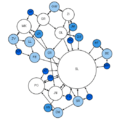Social network facts for kids
A social network is a group of people who connect and interact with each other. Think of it like a web where each person is a point, and the lines connecting them are their relationships. These relationships can be friendships, family ties, people who communicate often, or even people who help each other out.
When we talk about a social network, we're looking at the patterns of how people are connected. For example, a community social network shows how people and groups in a neighborhood are linked. These connections can offer social support, make people feel like they belong, and encourage them to help and protect one another.
How many people someone knows well or interacts with often usually doesn't go over a few hundred. As a network gets bigger, it can be harder to keep up with all the relationships. There's even a idea called the "Law of 150," which suggests that about 150 people might be the ideal size for a close-knit group like a small village or a large family group.
Sometimes, a problem called the "free rider problem" can happen in social networks. This is when someone benefits from the network, like getting help, but doesn't offer help back when others need it. Social networks are especially open to this because help is often needed suddenly, like during disasters. It can take time to figure out who is truly contributing to the group's safety and who is not.
Social networks are often formed because people share common interests. This could be a shared hobby, a sport, or even a religion. Places like a mosque, church, or temple are often centers for social networks. These networks can feel like a real group, even if they don't have an official name. Networks can be based on where people live, their families, or even global groups with similar interests.
The study of how people interact in social groups is called social psychology.
How Networks Help Us
Social networks are important because they can give us:
- Support: Friends and family in your network can offer emotional support or practical help when you need it.
- Belonging: Being part of a network makes you feel connected and like you're part of something bigger.
- Help: People in your network might help you with tasks, share information, or offer advice.
Related pages
Images for kids
See also
 In Spanish: Red social para niños
In Spanish: Red social para niños
 | Victor J. Glover |
 | Yvonne Cagle |
 | Jeanette Epps |
 | Bernard A. Harris Jr. |



